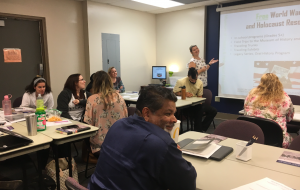On Friday, June 28, nearly 20 traditional and charter-school teachers gathered at Kennesaw State University for GCSA’s Teacher Symposium on culturally responsive pedagogy. During the symposium, Andrea Miskewicz, Onsite Education Coordinator for Kennesaw State University’s Museum of History and Holocaust Education, presented on teaching controversial topics through the use of primary sources.
Educators learned how to help students analyze primary sources such as letters, diaries, newspapers, video footage, objects and artifacts that give firsthand accounts of historical moments. They also were given tips to assist with teaching controversial topics. Miskewicz told educators to view, read or listen to all primary sources before incorporating them into their lessons; provide students with context and multiple perspectives of events; and to examine whether historical language needs further explanation or clarification. Teachers were also told they should explain to students that controversial events occur due to choices made by people not because they were bound to happen. The workshop concluded with an interactive activity on the atomic bomb where educators were split into groups and asked to select the most important primary sources to include in a time capsule on the historical event.
The presentation is just one of many offerings by the Museum of History and Holocaust Education. Schools can take advantage of in-school programs, traveling trunks, traveling exhibits, an oral history program and field trips to the Museum of History and Holocaust Education.
In addition to the presentation on controversial topics, educators participated in an interactive lunchtime presentation from GCSA solution provider, Make Music Count. The goal of Make Music Count is to eliminate the fear of math for students in grades 3-11. Students use iPads, android tablets, phones and laptops to solve math problems and play their favorite songs.
The teacher symposium concluded with a speech on cultural diversity and its impact for the current educator by Ave Tatum, Coordinator of Professional Development for Clayton County Public Schools. During the presentation, Tatum told participants that the definition of culture does not only include a person’s national, racial or ethnic identity. She says an individual’s familial, regional, and religious identity can also be characteristics of culture.
 Tatum used her own personal story to discuss the culture of poverty and how the cycle affects students. She said children sometimes come to school sick, hungry or homeless due to no fault of their own, and that can affect learning. For instance, Tatum described times in her life where her family could not afford to pay the electricity and she was unable to complete her homework in the dark. She also discussed how family dynamics such as students living with extended family rather than their parents and how that can play a role in student behavior. Tatum encouraged educators to recognize these special circumstances and do what they can to assist students affected by poverty.
Tatum used her own personal story to discuss the culture of poverty and how the cycle affects students. She said children sometimes come to school sick, hungry or homeless due to no fault of their own, and that can affect learning. For instance, Tatum described times in her life where her family could not afford to pay the electricity and she was unable to complete her homework in the dark. She also discussed how family dynamics such as students living with extended family rather than their parents and how that can play a role in student behavior. Tatum encouraged educators to recognize these special circumstances and do what they can to assist students affected by poverty.
Tatum told symposium attendees she is where she is today because a teacher at her elementary school made a huge difference in her life. She said the teacher recognized her potential and assisted her in and outside the classroom. Tatum encouraged educators at the symposium to act in a similar manner for their students. She said teaching does not stop the minute you leave the classroom. Tatum said educators who care will truly get to know who their students are and work on making an impact on the generations to come.